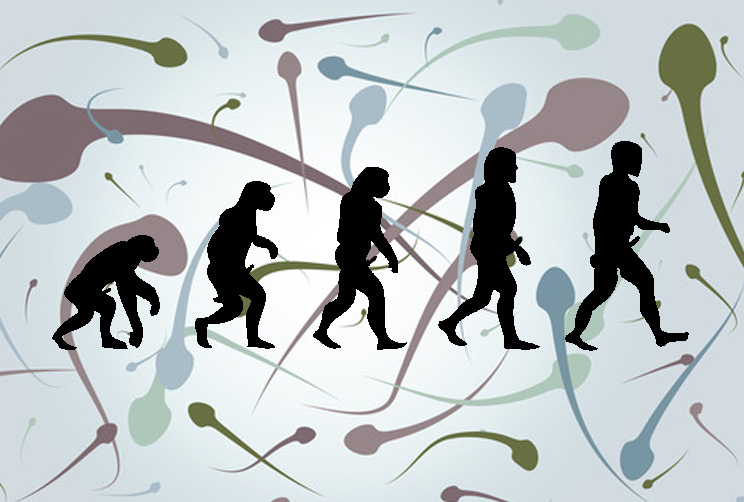I don’t know about you, but masturbation is not one of those things I associate with the stuff of history. Like snoring, nose picking, and butt scratching, it’s just one of those things people do that’s of no great consequence in the grand scheme of things. Be that as it may, masturbation does have a history of sorts and that, in an of itself, speaks volumes about human beings and the nature of our existence.
Before diving into masturbation’s history, it might prove useful to examine the role, if any, masturbation plays in the life of various related species – the monkeys in our family tree. While we are at it, a brief look at the prehistoric record might also help to illuminate the topic. The idea being to situate masturbation within the nature of life in general and the existence of homo sapiens sapiens in particular.
Primate Masturbation
It should come as no surprise to humans that primates (monkeys, lemurs, humans – yes we are primates -, and etc.) are notorious bators. Youtube videos like Funny Monkey Masturbation Compilation 2014 and Primate Masturbation Megamix provide ample evidence of this simple fact. The why of it, scientifically speaking, is less clear.
As one researcher put it (more than one actually), we know “surprisingly” little about the evolutionary roots and underlying purpose(s) of masturbation (Thomsen 2013). Our lack of knowledge shouldn’t really surprise anyone given the extent to which our understanding of sexuality is dominated by political, ideological, and even economic forces. Still, science is making headway in the study and understanding of non-human primate sexuality and this in turn may help us better understand ourselves.
Much of the current research on primate sexuality centers around the theory of sperm competition (Geoff Parker 1970). For those not familiar with the theory, it postulates that the real battle for supremacy in the mating game occurs after insemination. This is due to the common practice throughout the animal kingdom of females accepting matings from more than one male. Primates, including humans, are subject to varying degrees of sperm competition and we have developed/evolved strategies to deal with it.
One simple way to determine the degree of sperm competition in a given primate species is to measure size of the male testes. The production of a greater volume of ejaculate with higher quantities of sperm is an effective tactic in sperm competition. In the case of primates, the correlation between testes size and the level of sperm competition has been shown to be extremely high.

The primate with the largest testes is the northern giant mouse lemur (Mirza zaza) of Madagascar. If Mirza zaza were as big as human beings, their testes would be grapefruit sized. It’s an odd lemur with unusual mating behaviors. They breed year round and engage in fairly intense polygynandrous mating practices. Under the circumstances, sperm competition is extremely intense and the testes size clearly indicates this (Rode-Margono et. all, 2015). Watch youtube video, Giant mouse lemur is found to have giant testicles!
Among great apes, the chimpanzee has the largest testes proportional to its size. They have a multiple males – multiple female (MM-MF) breeding system with correspondingly high levels of sperm competition. Gorillas, despite being the largest of the great apes, have relatively small testes. One male (silver back) tends to dominate mating with several females, however multiple males, multiple female breeding does occur. Sperm competition is fairly low. Humans possess testes in the middle ground, between those of gorillas and chimpanzees. They indicate low to moderate levels of sperm competition, and there is considerable research confirming this is indeed the case.
Where exactly masturbation fits into the theory of sperm competition is not all that apparent at first glance. If anything, masturbation should handicap one’s ability to successfully compete in the all-important mating game by lessening the amount of sperm one enters into the contest, to begin with. As it turns out, bators have nothing to dispair. Studies of human sexuality indicate masturbation may play an important role in sperm competition. Masturbation flushes out older sperm leaving behind a lesser quantity of higher quality sperm that moves with greater velocity. This kind of sperm is retained in the female reproductive tract for a longer period of time resulting in higher probability of fertilization (Baker & Bellis 1993).

Some researchers believe Japanese Macaques employ masturbation’s higher quality, lower quantity approach to sperm competition. They are multiple males, multiple female seasonal breeders with high levels of sperm competition. During the mating season, one group of wild Japanese Macaques had a mean masturbation rate of 4.2 times per hour, or 50.4 times per 12 hour day with roughly 50% of all masturbation sessions resulting in ejaculation (Thomsen & Soltis, 2004) The world record for humans, held by Shigeru Tanaka of Japan, is 40 organisms in one 24 hour period and I think it is fair to note that Shigeru used a lubricant. Clearly, in the bating arena, Japanese Macaques can more than hold their own against men.
It is important to note that the studies don’t actually prove that the macaques masturbate to enhance sperm competition. What they demonstrate is a high correlation between rank/status and individual levels of masturbation with lower ranking males masturbating more. This does not contradict the theory of sperm competition, but there are other possible explanations.
Sperm competition theory, particularly to masturbation, has come under a considerable amount of criticism. The research is interesting but anything but conclusive and there is a real need for additional data collection. A recent study of masturbation among Cape ground squirrels (Xerus inauris) produced results diametrically opposed to those for macaques with the alpha males masturbating more than lower status males and doing so immediately after copulation rather than before (J. Waterman, 2010). This clearly indicates the need for an explanation of masturbation that is a bit more expansive than flushing out older less energetic sperm.
When you start looking at male male or female female sexual activity, sperm competition becomes an increasing less meaningful and satisfying explanation regardless of the underlying research. The same can be said for all grand theories of sexual adaptation. In fact, when applied to human beings these kinds of theories can be a fairly shallow, misleading, and represent potentially hurtful forms of “scientific” understanding. They certainly don’t explain how we feel or relate to our sexuality.
Stone Age Masturbation
Our current knowledge of human sexuality in prehistoric times is limited. Modern anatomical humans, homo sapien sapiens, first appeared somewhere around 200,000 to 150,000 years ago. Figurative art makes its first appearance about 40,000 years ago and depictions of human sexuality in this particular record are scarce. There just isn’t that much stuff to take a look at and our ability to get at sexual behavior through other means is limited.
There is some evidence, based on highly contentious studies, that homo sapien sapiens have been primarily monogamous from the very beginning. Supposedly the length ratio between the index and ring finger indicates the amount of androgen class hormones in a species. Small ring fingers relative to index fingers indicate less androgen and a higher likelihood of monogamous mating practices. It sounds a bit weird, but it checks out in studies of non-human primates.
The approach is not without its detractors, but it does allow us to take a peak at our ourselves 10’s of thousands of years ago, as well as extinct Hominina like Homo neanderthalensis. We don’t have that many digits hanging around from our extinct kin, so the results are limited and should be taken as suggestive at best. Based on what currently have, Neanderthals had longer ringer fingers ad so were more promiscuous, or to be more precise polygynous. A afranis (Lucy), technically not from the Subtribe Hominia, but a close relative dating back about 4 million years had a short ring finger indicating they were monogamous – well. to the extent their mate was eaten by a leopard (Nelson et. all, 2011).
 The earliest representation of masturbation I was able to find in the prehistoric record is “The Piscos River Man”, who dates back about 12,000 or more years. This Paleolithic era thin line carving on stone located in Côa Valley, Portgual clearly represents a man ejaculating with his erect penis (ithyphallic) in hand and a lightning bolt coming out the top of his head. There is virtually no room to interpret this drawing as anything other than a man masturbating (Angulo &García-Díez, 2009).
The earliest representation of masturbation I was able to find in the prehistoric record is “The Piscos River Man”, who dates back about 12,000 or more years. This Paleolithic era thin line carving on stone located in Côa Valley, Portgual clearly represents a man ejaculating with his erect penis (ithyphallic) in hand and a lightning bolt coming out the top of his head. There is virtually no room to interpret this drawing as anything other than a man masturbating (Angulo &García-Díez, 2009).
If you can only find one, then this is certainly the one you want. The lightening bolt emerging from the man’s head could represent something other than an orgasm, but if you accept that it does, then the work of art is completely transparent. It dissolves the many thousands of years separating us from work’s creator and unites us in the the common bond of our humanity. If only in this one respect, the reality of the world we experience is the same. There is something reassuring about this continuity in the record of human existence that helps to mute the often blinding lights of modern life with all its complexities. See youtube video Touchstone. The Rock Art of Côa Valley.
[av_hr class=’short’ height=’50’ shadow=’no-shadow’ position=’center’ custom_border=’av-border-thin’ custom_width=’50px’ custom_border_color=” custom_margin_top=’30px’ custom_margin_bottom=’30px’ icon_select=’yes’ custom_icon_color=” icon=’ue808′ font=’entypo-fontello’ av_uid=’av-1udgvg’]






Very interesting article. It’s hot when you consider that in society today, we’ve created an almost infinite number of stimuli to elicit excitement, arousal, pleasure, and entertainment from each other. But the first human males, hairy, muscular, nearly naked, and bored, huddled around a fire in some cave, didn’t have any sophisticated forms of entertainment.
Their lives were harsh and dull but also VERY physical. They had to constantly push their bodies to their limits just to survive. All that taken together, you have to conclude that the sexual pleasure they derived from their cavemen cocks must have been the most intense and important phenomenon in their lives. I’d imagine every caveman spent his miserable days looking forward to that awesome moment that night when he’d join up with his horny buddies to obscenely and proudly masturbate each other, letting out some epic, primal grunts when they all start throwing ropes of cum out and around their bate circle, hairy bodies getting sprayed with hot, sticky, caveman sperm. 🙂
that last paragraph made me cum everywhere thanks a lot Aaron